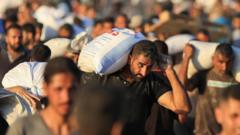How Many Lives Were Lost in Gaza as People Awaited Aid?

Understanding the Humanitarian Crisis in Gaza: Recent Developments
The ongoing humanitarian crisis in Gaza has escalated dramatically in recent weeks, with tragic incidents leading to significant loss of life. Reports indicate that at least 30 Palestinians were killed while waiting for humanitarian aid, a situation that has drawn widespread condemnation and concern from international observers. This article aims to delve deeper into the current state of affairs in Gaza, examining the impact of military actions on civilians, the pressing humanitarian needs, and the international response to the crisis.
The Incident: A Tragic Turn of Events
On a recent Wednesday, the Hamas-run civil defense agency reported that Israeli gunfire resulted in the deaths of at least 30 Palestinians. These individuals were part of a crowd gathered to receive much-needed humanitarian aid. Eyewitness accounts and hospital reports indicate that the situation was dire, with around 300 others wounded as a result of the gunfire.
Israel's Defense Forces (IDF) stated that they had fired "warning shots" after a large gathering near aid trucks, approximately 3 kilometers southwest of the Zikim crossing. They claimed that they were unaware of any casualties resulting from their actions, although local reports tell a different story. Mohammed Abu Salmiya, director of al-Shifa Hospital in Gaza City, mentioned that his facility had received 35 bodies, while the hospital later confirmed that the death toll had risen to at least 48.
The Humanitarian Situation: A Growing Crisis
The humanitarian situation in Gaza has been deteriorating for months, exacerbated by ongoing conflict and blockades that limit access to essential supplies. According to the UN human rights office, over 1,000 Palestinians have been killed while attempting to access food aid since late May. This staggering statistic highlights the life-threatening conditions that civilians face daily.
Moreover, the health ministry in Gaza has reported that more than 150 individuals, including 89 children, have died from malnutrition since the onset of the Israel-Hamas war in 2023. The dire need for food, water, medical supplies, and fuel is becoming increasingly urgent, as conditions continue to worsen.
International Response: Calls for Action
The international community has been vocal in its response to the escalating crisis in Gaza. UN Secretary-General Antonio Guterres has called for an increase in aid deliveries, stating that the current "trickle of aid" must transform into a robust flow to meet the humanitarian needs of the population. He emphasized that food, water, medicine, and fuel must be allowed to enter Gaza without obstruction to alleviate the suffering of its residents.
In a related development, US Special Envoy Steve Witkoff is set to travel to Israel to discuss the humanitarian situation in Gaza. This visit underscores the urgency of addressing the crisis, particularly as Canada, alongside France and the UK, has announced plans to recognize a Palestinian state at the upcoming UN General Assembly in September. This move marks a significant shift in international diplomatic efforts concerning the Israeli-Palestinian conflict.
Understanding the Broader Context
The conflict between Israel and Hamas has deep historical roots that contribute to the current humanitarian crisis. The recent military offensive launched by Israel was a response to a Hamas-led attack on southern Israel on October 7, 2023, which resulted in significant casualties. Approximately 1,200 people were killed in that attack, alongside 251 others taken hostage, prompting Israel's military retaliation.
Since then, the toll of the conflict has been staggering, with reports indicating that over 60,000 Palestinians have died in Israel's military campaign in Gaza. Among those casualties are 18,592 children and 9,782 women, highlighting the disproportionate impact of the conflict on vulnerable populations.
Challenges in Aid Distribution
Despite international calls for increased humanitarian aid, challenges remain in the effective distribution of assistance in Gaza. The Israeli government maintains that it is not imposing restrictions on aid entering the territory. However, these claims have been met with skepticism from several European nations and UN representatives, who argue that the flow of aid is insufficient to meet the needs of the population.
Organizations on the ground, including various humanitarian agencies, have reported difficulties in delivering aid due to ongoing military operations and security concerns. The situation is further complicated by the blockade imposed by Israel, which restricts the entry of essential goods into Gaza, exacerbating the already dire conditions faced by the residents.
The Human Cost of Conflict
As the conflict continues, the human cost continues to rise. The deaths and injuries reported are not just numbers; they represent families shattered, communities devastated, and lives lost. The emotional and psychological toll on those who survive is profound, as the ongoing violence disrupts daily life and creates an atmosphere of fear and uncertainty.
Many families are left without basic necessities, struggling to find food and safe shelter. The plight of children in particular is heartbreaking, as they bear the brunt of the violence and instability, facing trauma that can last a lifetime.
The Path Forward: Seeking Solutions
As the situation in Gaza continues to unfold, the need for a sustainable solution becomes increasingly urgent. International diplomatic efforts must focus on creating a framework for peace that addresses the underlying issues of the Israeli-Palestinian conflict. This includes recognizing the rights and needs of both Israeli and Palestinian populations.
Humanitarian aid must be prioritized, with mechanisms established to ensure that assistance reaches those who need it most without obstruction. Furthermore, dialogues must take place between all parties involved to establish a lasting ceasefire and build trust for future negotiations.
Conclusion: A Call to Action
The recent tragic events in Gaza serve as a stark reminder of the urgent humanitarian crisis facing the region. As the international community grapples with the complexities of the conflict, it is vital that we remember the human cost of war. The lives lost, the suffering endured, and the futures jeopardized all call for immediate action and a concerted effort to bring about peace and stability.
As we reflect on the situation in Gaza, we must ask ourselves: How can we, as global citizens, contribute to a solution that prioritizes human rights and dignity for all? The path forward requires courage, compassion, and a commitment to fostering dialogue and understanding.
FAQs
What caused the recent escalation in violence in Gaza?
The recent escalation in violence is largely attributed to a military offensive launched by Israel in response to a Hamas-led attack on southern Israel that resulted in significant casualties.
How has the international community responded to the humanitarian crisis in Gaza?
The international community has called for increased humanitarian aid, with UN officials emphasizing the need for a substantial flow of resources to alleviate the suffering of the population.
What are the main challenges faced in delivering aid to Gaza?
Challenges include ongoing military operations, security concerns, and the blockade imposed by Israel, which restricts the entry of essential goods into the territory.
How many Palestinians have been affected by the conflict?
Reports indicate that over 60,000 Palestinians have died in the conflict, with a significant number of casualties being women and children.
As we consider the ongoing situation in Gaza, it is crucial to advocate for humanitarian efforts and support policies that prioritize peace and dignity for all. #GazaCrisis #HumanRights #PeaceForGaza
```Published: 2025-07-31 05:35:12 | Category: technology



